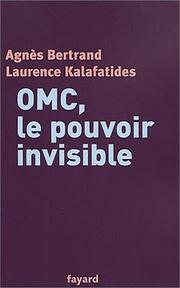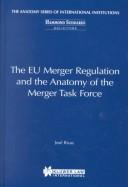| Listing 1 - 10 of 1542 | << page >> |
Sort by
|

ISBN: 2213611289 9782213611280 Year: 2002 Publisher: Paris : Fayard,
Abstract | Keywords | Export | Availability | Bookmark
 Loading...
Loading...Choose an application
- Reference Manager
- EndNote
- RefWorks (Direct export to RefWorks)

ISBN: 9041107118 Year: 1997 Volume: *1 Publisher: London Kluwer law international
Abstract | Keywords | Export | Availability | Bookmark
 Loading...
Loading...Choose an application
- Reference Manager
- EndNote
- RefWorks (Direct export to RefWorks)
Book
ISBN: 0191859133 0192549758 Year: 2018 Publisher: Oxford : Oxford University Press,
Abstract | Keywords | Export | Availability | Bookmark
 Loading...
Loading...Choose an application
- Reference Manager
- EndNote
- RefWorks (Direct export to RefWorks)
The WTO's Trade Policy Review Mechanism, which reviews the trade policies and practices of each WTO member at regular intervals, is generally considered to function well. In this day and age, complacency is unwise. Examining trade policy reviews throughout the lifetime of the TPRM, this work details its evolution from Article X of the General Agreement on Tariffs and Trade to the proposed modifications resulting from the mechanism's latest appraisal, examining the budgetary capabilities and technical performance of all the main entities who participate in the reviews.
Book
Year: 1999 Publisher: Leuven KUL
Abstract | Keywords | Export | Availability | Bookmark
 Loading...
Loading...Choose an application
- Reference Manager
- EndNote
- RefWorks (Direct export to RefWorks)
Book
Year: 2000 Publisher: Brussel Centrale Raad voor het Bedrijfsleven
Abstract | Keywords | Export | Availability | Bookmark
 Loading...
Loading...Choose an application
- Reference Manager
- EndNote
- RefWorks (Direct export to RefWorks)
Book
Year: 1968 Publisher: London HMSO
Abstract | Keywords | Export | Availability | Bookmark
 Loading...
Loading...Choose an application
- Reference Manager
- EndNote
- RefWorks (Direct export to RefWorks)
Book
Year: 1968 Publisher: London HMSO
Abstract | Keywords | Export | Availability | Bookmark
 Loading...
Loading...Choose an application
- Reference Manager
- EndNote
- RefWorks (Direct export to RefWorks)
Periodical
Year: 2011 Publisher: Beijing : [University of International Business and Economics],
Abstract | Keywords | Export | Availability | Bookmark
 Loading...
Loading...Choose an application
- Reference Manager
- EndNote
- RefWorks (Direct export to RefWorks)
Book
Abstract | Keywords | Export | Availability | Bookmark
 Loading...
Loading...Choose an application
- Reference Manager
- EndNote
- RefWorks (Direct export to RefWorks)
"The authors examine the effects of WTO agreements and domestic trade policy reforms on production, welfare, and poverty in Bangladesh. They use a sequential dynamic computable general equilibrium (CGE) model, which takes into account accumulation effects, allowing for long-run analysis. The study is based on the 2000 Social Accounting Matrix (SAM) of Bangladesh including 15 production sectors, four factors of production (skilled and unskilled labor, agricultural and nonagricultural capital), and nine household groups (five in rural areas and four in urban areas). To examine the link between the macroeconomic effects and microeconomic effects in terms of poverty, the authors use the representative household approach with actual intra-group income distributions. The study presents five simulations for which the major findings are: (1) The Doha scenario has negative implications for the overall macroeconomy, household welfare, and poverty in Bangladesh. Terms of trade deteriorate and consumer prices, particularly food prices, increase more than nominal incomes, especially among poor households. (2) Free world trade has similar, but larger, impacts. (3) Domestic trade liberalization induces an expansion of agricultural and light manufacturing sectors, favorable changes in the domestic terms of trade. Although the short-run welfare and poverty impacts are negative, these turn positive in the long run when capital has adjusted through new investments. Rising unskilled wage rates make the poorest households the biggest winners in terms of welfare and poverty reduction. (4) Domestic liberalization effects far outweigh those of free world trade when these scenarios are combined. (5) Remittances constitute a powerful poverty-reducing tool given their greater importance in the income of the poor. "--World Bank web site.
Book
ISBN: 9403522100 9403522046 Year: 2020 Publisher: Alphen aan den Rijn, The Netherlands : Wolters Kluwer,
Abstract | Keywords | Export | Availability | Bookmark
 Loading...
Loading...Choose an application
- Reference Manager
- EndNote
- RefWorks (Direct export to RefWorks)
Trade and Environment Governance at the World Trade Organization Committee on Trade and Environment' focuses on resolving the conflict between environment and trade norms through dispute settlement mechanisms. The author of this book has interacted as an ambassador with negotiators, such as the World Trade Organization (WTO) Secretariat, media, and academics. This book has very little competition as it is one of the first of its kind to have systematically analyzed WTO's Committee on Trade and Environment (CTE) in great depth and designed environmentally friendly trade policies by taking into consideration the perspectives of the developing-developed economies. It aims to demonstrate that increased knowledge and experience-sharing plus coordination among international and local experts and the professional bureaucracy are key to formulating practical approaches to new rules in the areas of trade and environment governance and minimizing potential policy conflicts.
| Listing 1 - 10 of 1542 | << page >> |
Sort by
|

 Search
Search Feedback
Feedback About UniCat
About UniCat  Help
Help News
News